This research discusses the effects of homework on students' psychological well-being, both negative and positive. Homework has been a traditional method for control and attainment in academic success, but overwork has been found to lead to stress, anxiety, lack of sleep, and less free time. Based on a combination of a survey of Nazarbayev Intellectual School students and an interview with a school psychologist, the study found that quality homework enhances learning, but overwork has a negative effect on student psychological state. Mathematics homework and writing tasks were determined to be the most stressful. The study indicates that over two hours of homework per evening can lead to burnout, and lighter workloads can significantly decrease stress levels. It recommends a more balanced approach to homework—teachers must adjust assignments to meet students' levels, and parents must establish a proper routine at home to ensure student well-being along with academic success.
Keywords: homework, mental health, student well-being.
Introduction
Homework is a long-standing part of educational systems, intended to reinforce classroom learning. However, its role in modern schooling has sparked debate, particularly regarding its psychological effects. According to psychologist Robert Leahy, today’s students experience anxiety levels similar to psychiatric patients in the 1950s. Homework is a key contributor to this stress. A Stanford University study (2016) showed that 56 % of students reported homework as their primary source of stress, with side effects such as sleep deprivation and health issues. Thus, this research aims to evaluate the relationship between homework and mental health and propose ways to improve current practices for the benefit of students, educators, and parents.
In contemporary society, where academic success is often placed above mental health, it is especially important to investigate whether the current homework system contributes more to learning or to student burnout. Through an analysis of both the advantages and disadvantages of homework the findings of this project will be valuable not only to students, but also to educators, school administrators, and parents. Via primary and secondary sources, the project will analyze different perspectives about this issue and will help to create balanced educational policies that promote academic achievement and student wellness.
Literature review
In recent years, homework has become a concern for majority of people, connecting with its impact on the psychological well-being of students. Homework can promote discipline and improve academic outcomes. Cooper et al. (2006) found that students assigned appropriate homework scored 23 percentile points higher on average than those with no homework. Guo et al. (2024) similarly concluded that homework positively influences performance (g = 0.45). In other words, home tasks are useful tools to enhance academic performance and to create self-regulation, so to receive high scores on exams.
However, excessive homework can contribute to mental health challenges, like stress or anxiety. When students spend 6 or 7 hours in school and another 3 or more hours on homework, they face a longer workday than most adults (Galloway& Pope (2007), p.64). Finding raises concerns about the fact, that many students are dedicating majority of the day to academic tasks, sometimes even more than adults, so homework cuts into time needed for other essential activities. Hinchey (1996) reported that high school students repeatedly said that they do not have free time as teachers assumed. Rai (2021) agrees with him and says that students do not like to spend much time doing homework as teachers expect them to. They would love to have some social life after school and spend some leisure time at home after quickly completing their homework (p.55). These shared perspectives underline the psychological stress and lack of balance between work and hobby that excessive homework create.
Moreover, homework has a lot of pressure on teenagers, reducing their productivity. The Cooper synthesis (1989) reported that for junior high school students, the benefits of homework increased as time increased, up to 1 to 2 hours of homework a night, and then decreased. This evidence suggests that overloading pupils leads to different issues. Students in 10 high-performing high schools average more than 3 hours of homework per night and students who did more hours of homework experienced more academic stress, physical health problems, and lack of balance in their lives (Galloway, Conner, Pope (2013)). This data confirms the fact that current homework practices at schools disturb full engagement and create well-being problems. Scheb (2023) states that St. Patrick's Catholic School reduced the amount of homework they were assigning by 50 % and the number of students reporting high to moderate levels of stress decreased by nearly 30 % (p. 130). This demonstrates that homework policies in the modern schools needs new changes, as home tasks significantly impact pupils’ mental state
Recognizing those issues, educators and parents should support students and address homework related problems. Marzano and Pickering (2007) make а guideline for teachers related to homework. They recommend tasks that introduce new content, help students practice skills independently but not yet fluently, and allow students to explore topics of personal interest. Research notes that to maximize the effectiveness, homework should be designed to align with students’ abilities, ensuring it is not too difficult and managing workloads. Moreover, schools and teachers should regularly change their homework policies and adapt them to meet the needs of diverse learners. Galloway& Pope (2007) recommend that schools regularly monitor homework load and consider policies that set a maximum number of homework hours each day (p.64). Their findings also suggest that school homework policies and reform efforts must consider usefulness and relevance of homework, not time on task. Parents also have an important role in helping create a positive learning environment at home: routine, resources, and open communication of challenges students encounter. Educators and parents working in combination can do homework а balanced part of students' education.
In conclusion, while homework is a great technique to improve academic performance, excessive work has a negative effect on the students' mental health, work productivity, and а work-life balance. The homework policy needs to be balanced, equal to pupil’s skills. It is important for educators and parents to work together to provide аn supportive environment that help to avoid stress and other homework related challenges.
Method Section
This study used a mixed-method approach, combining quantitative data from a student survey with qualitative insights from an expert interview. The survey was completed by 102 students from different grade levels at Nazarbayev Intellectual School, a highly demanding academic environment ideal for studying homework-related stress.
The interview was conducted with a school psychologist with 10 years of experience working with students. Her observations provided valuable professional insight into how homework affects students’ mental health. The combination of both methods ensured a comprehensive understanding of the issue, blending statistical trends with expert interpretation.
Results section
In primary research, used a survey among 102 NIS students of different age groups and an expert interview with NIS Uralsk school psychologist.
According to the survey, 46,1 % of the students admitted that it helps to strengthen knowledge in class and enhance independent study habits, rating its usefulness for 4 or higher. The psychologist agreed with it, saying that properly balanced homework assignments cause students to study and learn about subjects in depth. However, she said that too much homework takes away from such gains by increasing stress and lowering overall health. One of the greatest disadvantages is insufficient sleep. It was noticed in the survey that more than half of the students spend over two hours each night on homework, leading to a lack of concentration and low energy levels for all day. The expert highlighted that the students actually require a sleeping period of about eight hours to be in good condition, but most do not receive it because of their homework.
Several reasons were revealed to be causes of stress. One third of the students indicated that the homework they were given was too much, and they could not handle schoolwork together with other things and felt stressed. The expert confirmed these findings, stating that homework must be assigned based on students' mental abilities. She suggested that assignments be regulated to adapt it to different learning levels because weaker students may become frustrated, not understanding the topic. Writing assignments (79,4 %) and math calculations (62,7 %) are the most stressful tasks for a lot of students, showing that they have problems in understanding themes of those subjects.
According to psychologist, schools do not typically consider how much total homework students receive in different subjects, leading to overwhelming workloads. Approximately 72 % chose to receive tasks for home every day. Specialist explained how students are staying up late doing work, particularly before exams, and are only sleeping 2–3 hours per night, because assigned tasks are too much. The psychologist commented that excessive academic pressure can result in rising anxiety and emotion control problems. She continued by saying that the majority of students have no time for leisure or after-school activities, which could otherwise be employed as stress mitigation factors, while many students confirmed it in their answers.
Both the survey and the interview showed potential solutions to improve students' homework experience. Workload balance by ensuring that homework given is within the capacity of the students is one of the major recommendations. Same as psychologist, some students suggested that some important subjects, like mathematics or physics should be given more emphasis, while other subjects should have their homework load reduced. Parental involvement is also significant. The psychologist highlighted that parents need to assist students in organizing time effectively and in supporting. Healthy activities, such as sports, outdoor activities, and stress-reduction methods, may also aid students in balancing their stress levels. Teachers can help by giving more specific deadlines and putting quality over quantity in homework assignments. A major part of the students feel that teachers need to have a larger role in assisting students with their workload. The expert recommended that schools could have more scheduling systems to avoid giving students multiple large assignments on the same day.
An outlier appeared in the survey: one student reported that they spend less than 30 minutes per day on homework, experience no stress, and still achieve high academic results. This unusual case may be due to strong time management skills, fast learning ability, or external academic support, and highlights that personal differences can strongly affect homework experience.
The findings indicate that while homework plays an important role in fostering learning, excessive work and challenging assignments are causes in stress, sleep deprivation. The results refer to the need to pursue a more balanced approach, considering students' abilities and mental health. Through the control of workloads, the strengthening of parental and teacher support, and the encouragement of healthy habits, students are more capable of managing homework without impacting their well-being.
Conclusion
Through this project the influence of homework on mental health of students was determined by exploring the positive and negative effects of homework on well-being and reasons behind homework-related problems. The findings from both primary and secondary research provide a complex picture of the role of homework in students' academic and everyday lives.
Regarding effects of home tasks, primary and secondary sources agree that homework in an acceptable amount can enhance independent learning and improve academic performance. In the survey, nearly half (46.1 %) of students claimed that homework helps to develop knowledge. This aligns with Cooper et al. (2006), who found that appropriate homework positively affects performance at school, increasing test scores significantly. The school psychologist also confirmed that students benefit when homework refines understanding without overwhelming them. However, both researches also highlight the drawbacks of excessive homework. Galloway and Pope (2007) state that over 3 hours of daily homework contributes to anxiety and burnout, which the specialist supported, saying that students often get lack of sleep, with about 2–3 hours of sleep before exams. This shows that the impact of homework depends on its quantity and complexity.
According to the survey, 79.4 % of students indicated writing assignments caused the most stress, while 62.7 % found math calculations the most stressful one. Other sources agreed with it, stating that high workload, small connection of subjects, and difficulty of tasks as the key stressors. Marzano and Pickering (2007) suggest that tasks must match students' skill levels to avoid stress. School psychologists also discuss that large tasks can be frustrating for some students with lower abilities, so tasks should be based on student’s personal skills.
In answering how quantity affects mental health, both sources agree that over two hours per night is problematic. The psychologist observed increased stress and lack of sleep among students, which matches with the survey where many students reported low energy and no time for leisure as bad effect of home tasks to their personal life. This further supports Scheb (2023), who found that reducing homework by 50 % decreased stress levels by 30 %.
There are some unique points between the results of researches in the suggested solutions. Secondary sources often recommend educational policy changes—such as limiting total homework hours (Galloway et al., 2013)—while the expert interview emphasized strategies, connected with surrounding of a student: his teachers adapting tasks to level of individual, and his parents creating supportive environment at home. Despite their differences, both perspectives are valuable, yet it suggests that effective reform must happen at both levels—classroom and policy.
In conclusion, this project finds that while homework is an effective academic tool when it is well-structured, excessive assignments contribute to declining mental health, requiring changes in current educational system. That is why the academic workload also needs a balanced approach, where teachers control the amount and difficulty level of tasks, while parents should support healthy routine at home.
Appendices
Appendix A: Charts and Graphs
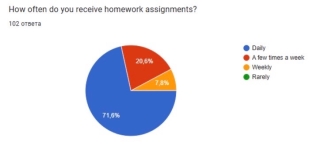
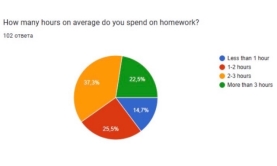
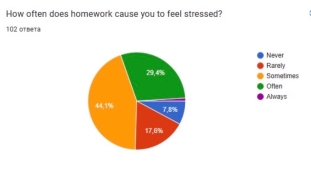

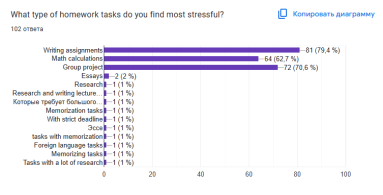
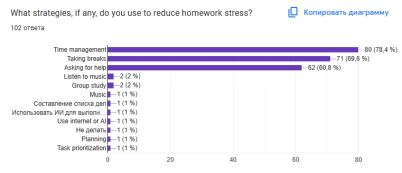
References:
- Blanco Sarmiento, E. (2014). Intensive reading based on cross-curricular topics: A strategy to foster students’ reading comprehension. Universidad de La Sabana. https://intellectum.unisabana.edu.co/bitstream/handle/10818/10788/Elisabeth %20Blanco %20Sarmiento(TESIS).pdf;sequence=1
- Cooper, H. (1989). Synthesis of research of homework. https://files.ascd.org/staticfiles/ascd/pdf/journals/ed_lead/el198911_cooper.pdf
- Cooper, H., Robinson, J. C., & Patall, E. A. (2006). Does homework improve academic achievement? A synthesis of research, 1987–2003. Review of Educational Research, 76(1), 1–62. https://www.lincnet.org/cms/lib05/ma01001239/centricity/domain/108/homework.pdf
- Galloway, M., & Pope, D. (2007). Hazardous homework? The relationship between homework, goal orientation, and well-being in adolescence. Encounter, 20(3), 55–58. https://coffin.wordpress.com/wp-content/uploads/2011/09/encounter-homework-issue.pdf#page=55
- Galloway, M., Conner, J., & Pope, D. (2013). Nonacademic effects of homework in privileged, high-performing high schools. The Journal of Experimental Education, 81(4), 490–510. https://doi.org/10.1080/00220973.2012.745469
- Guo, L., Li, J., Xu, Z., Hu, X., Liu, C., Xing, X., Li, X., White, H., & Yang, K. (2024). The relationship between homework time and academic performance among K‐12: A systematic review. Campbell Systematic Reviews, 20(3). https://doi.org/10.1002/cl2.1431
- Lehrer, J. (2011, January 14). American anxiety: The three real reasons why we are more stressed than ever before. Slate Magazine. https://slate.com/culture/2011/01/american-anxiety-the-three-real-reasons-why-we-are-more-stressed-than-ever-before.html
- Marzano, R. J., & Pickering, D. J. (2007). The case for and against homework. Educational Leadership, 64(6), 74–79. https://files.ascd.org/staticfiles/ascd/pdf/journals/ed_lead/el200703_marzano.pdf
- Oxford Learning. (2016, October 4). Infographic: How does homework actually affect students? Oxford Learning. https://www.oxfordlearning.com/how-does-homework-affect-students/
- Rai, J. (2021). Why does homework cause stress in students? In L. Gnawali, S. Laudari, S. Shrestha, Nepal English Language Teachers’ Association, & R. Smith (Eds.), Exploratory action research: Stories of Nepalese EFL teachers (pp. 38–50). Rajendra Man Singh, AD Graphics Nepal, & The A. S. Hornby Educational Trust. https://nelta.org.np/uploads/upload/G9ZEun.pdf#page=50
- Scheb, R. (2023). Does homework work or hurt? A study on the effects of homework on mental health and academic performance. ERIC. https://eric.ed.gov/?id=EJ1410969

